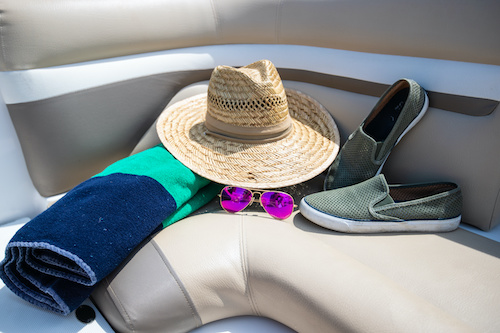Performing regular boat maintenance will keep your pride and joy looking and running like new, and learning how to clean boat seats is an important part of your regular maintenance regime. In fact, it’s probably the single most important thing you can do to keep those seats in good shape.
Modern marine vinyls are treated with anti-microbial, anti-fungal, and anti-stain barriers, which do a good job of keeping mildew and mold from attacking and dirt from sticking. But if you allow contaminants to get into the material, mold and mildew can get a foothold in the vinyl. And if you clean your seats improperly, you can scrub or chemically burn those important treatments away.
Here’s how to keep those boat seats in tip-top shape in five easy steps.
5 Steps for Cleaning Boat Seats
- Rinse them down with freshwater then clean the vinyl cushion with a soft rag and gentle soap as often as possible, preferably at least once a week.
- Give them a deep cleaning with a soft rag and gently soap at least once a month.
- Avoid using an aftermarket vinyl cleaner unless and until mold or mildew that can’t be gently scrubbed away appears on the boat seats. When it does, use a dedicated vinyl cleaner to remove it.
- After using any vinyl cleaner, allow the seat’s surfaces to dry completely and then apply a vinyl protectant.
- Never use caustic cleaners (especially bleach) or stiff bristly brushes on boat seats.
How to Clean a Boat: Boat Cleaning Basics
Proper Techniques for Rinsing & Cleaning Your Boat's Vinyl Seats
The key to keeping boat seats in great shape is cleaning away dirt and contaminants prior to mold or mildew setting in. Once it does, that nasty stuff grows into the cushions as well as the vinyl and then it becomes practically impossible to get rid of.
How to clean vinyl boat seats of mildew, in particular, is as frustrating as it is confusing because even if you manage to clean it off the surface, it’ll just grow back from the inside out. So make sure that regular washing takes place as often as possible. Once a week should be considered minimal, unless your boat is kept indoors in a controlled environment. In that case, once every few weeks should do the trick.
Additionally, be sure to rinse down those seats after each and every use—even if they look perfectly clean. Things like suntan lotion, bug repellent, or sweat may not be visible but they need to be sluiced away nonetheless.
- Always use freshwater, a soft rag or wash mitt, and remember that the best cleaner for boat seats is simply a gentle soap.
- Rather than scrubbing hard at dirt or stains, when the seats need a deep cleaning soak them down and soap them up and wait a few minutes so any dirt or grime loosens up.
- Then give them another gentle wipe-down.
- Keep up the process for several cycles until the vinyl comes clean.
- Do this on a monthly basis regardless of how the boat seats look or whether you’ve used the boat or not, because even if it’s kept indoors dust and airborne contaminants will settle on the surface.
Basic Boat Maintenance Checklist for New Boaters
What is the Best Cleaner for Boat Seats?
Most seat manufacturers recommend that you stay away from using aftermarket treatments on the vinyl for as long as possible. But you have to remember that over time, the treatments the manufacturer gave to the seats does wear and weather away.
Dedicated Vinyl Cleaners
At some point (just how many seasons it takes will vary quite a bit depending on the climate in your area, the amount of use the boat gets, and how well you maintain it) stains will become more difficult to remove and those ugly black dots will set in. At this point, you’ll probably need to reach for a dedicated vinyl cleaner. After using it be sure to wash the seats down again, let them dry completely, and then apply a dedicated vinyl protectant.
Stay Away from Caustic Cleaners (Including Bleach)
Its critically important to stay away from caustic cleaners, no matter how tough it becomes to get those boat seats clean. Bleach in specific is a big no-no. Not only will tough cleaners eliminate whatever anti-microbial, anti-fungal, and anti-stain properties remain, they will also damage the vinyl itself and turn it brittle; rips and tears in the material won’t be far behind. The threads used to sew the vinyl seats together can also be damaged, and stitching won’t last long after such treatment.
If you care for your boat seats and clean them regularly, just how long will they last? Again, that depends on where your boat’s located, how it’s used, and how it’s stored. But we can say one thing, for sure: the more you clean your boat seats the longer they’ll last, and the longer your boat will look like it’s new.
Gel Coat Repair: Fixing a Boat's Minor Scrapes & Scratches
You May Also Like:



